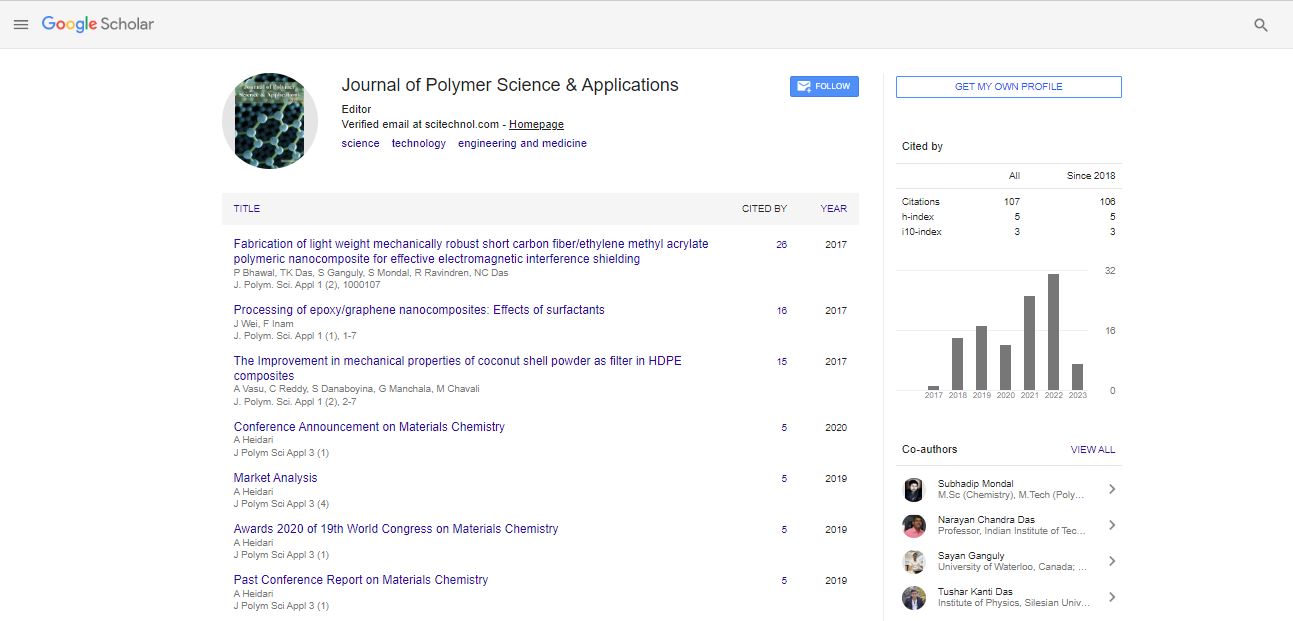Production of functionalized core-shell particles for the synthesis of active biocatalysts
Martina Pinto, Evelin A Manoel, Frederico W Gomes, Eliane P Cipolatti, Denise M G Freire and Jose Carlos C
Pinto
The Federal University of Rio de Janeiro, Brazil
: J Polym Sci Appl
Abstract
Developments in biotechnology may lead the industry to a more sustainable future, based on environmentally friendly processes, efficient biocatalyst systems, and low energy demanding processes. Thus, the search for sustainable and economically viable processes has arisen the interest in enzyme immobilization methodologies and in the production of distinct polymer supports. Depending on the support used in the immobilization process, the biocatalyst may exhibit particular activities. In this context, one group of supports that should be highlighted comprises core-shell polymer supports synthesized through combined suspension/emulsion polymerization. This technique can be very advantageous because it allows the production of porous particles on a micrometric scale and the functionalization of the shell of the particles. In this way, new polymeric coreshell particles produced through combined suspension and emulsion polymerization process were produced for the synthesis of high-performance enzymatic biocatalysts. Particularly, distinct comonomers, containing different functional compounds (such as glycidyl methacrylate, methyl methacrylate, styrene, and divinylbenzene), were added to the polymerization step in order to produce particles with distinct textural properties, including high specific area, porosity, and distinct hydrophobicity degree. Then, such core-shell particles were employed as supports for the immobilization of lipases. The performances of the obtained biocatalysts were investigated in esterification reactions. It was observed that the addition of epoxide groups resulted in a decrease in the specific area of the particles (P(S-co- DVB-co-GMA)/P(S-co-DVB-co-GMA - 38m²/g) compare to (P(S-co- DVB)/P(S-co-DVB) - 44m²/g). Nevertheless, the epoxide-biocatalysts exhibited better performance in esterification reactions (conversion of 91.9%), similar to the commercial biocatalyst Novozym 435 conversion of 93.1%).
Biography
Martina Pinto completed her PhD in Chemical Engineering from the Chemical Engineering Program at COPPE - Federal University of Rio de Janeiro, BRA (2017). Due to her performance in Chemical Engineering Program at COPPE/UFRJ (2011), she was invited to the Direct Doctorate by the COPPE/UFRJ Program. She carried out research activities in the area of functionalization of polymeric materials during the Sandwich Doctorate at Queen Mary University of London in 2016. Currently, she works as a Post- Doc at COPPE/UFRJ, uniting the areas of Polymerization Engineering and Biotechnology. She has over 20 publications, has been cited over 300 times, and her publication H-index is 10 (Google scholar).
 Spanish
Spanish  Chinese
Chinese  Russian
Russian  German
German  French
French  Japanese
Japanese  Portuguese
Portuguese  Hindi
Hindi 